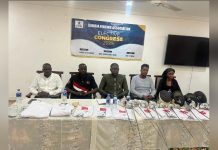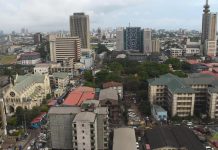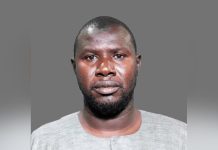
Africa-Press – Gambia. Announcements made as EAA celebrates taking the world closer to Universal Primary Education, after reaching its initial goal of enrolling 10 million of the world’s most marginalized children
Doha – (9 December 2021) – The global education foundation, Education Above All (EAA) joined with governments on Wednesday to take the next steps in their journey to secure universal primary education. Gathered at the WISE Summit on education in Doha, EAA’s Educate A Child (EAC) programme announced partnerships with the governments of Djibouti, Zanzibar, Rwanda and The Gambia to attain Zero Out of School Primary Children (OOSC) in their countries. The focus is set to be on the most invisible such as those working inside homes, children with disabilities, and refugees.
The commitments form part of EAC’s wider Zero campaign to show that, through a new focused, localised and partner-led model that targets a country’s hardest to reach OSSC, primary aged children can be enrolled in education. Moreover, in recognition of its status as an innovative and effective solution to some of the world’s most entrenched challenges, EAA’s “Educate Every Child: Zero OOSC” goal will also officially be included in the UN’s Decade of Action, which aims to use the next decade to accelerate progress on the Sustainable Development Goals (SDGs).
“We welcome these governments in joining the journey to achieve Zero out of primary school children and call on more countries to partner with us,” said Her Highness Sheikha Moza bint Nasser, Chairperson of EAA and UN Sustainable Development Goals Advocate. “The reasons children are not enrolled in education are complex; the challenge is great, and it requires co-operation. Our work, alongside our partners, shows that it is possible to make a difference. Education is the key to a better, more stable and more prosperous world. We must educate every child at the primary level, no matter their circumstances, gender or geographic location.”
The announcements mark EAA’s drive to support countries in realising Universal Primary Education (UPE) and come off the back of the remarkable achievement of enrolling 10 million children in education. “Zero” also marks EAA’s latest strategy to move beyond working with non-governmental partners only and towards collaborating directly with selected governments to enrol the most invisible and hardest to reach children.
In Zanzibar EAA has partnered with UNICEF to reach the country’s Zero goal. The US$6 million co-funded programme will aim to enrol 35,732 OOSC across the island and will work to boost access amongst the most disadvantaged children in a country where poverty, overcrowding and compromised quality in education mean 10 % of children drop out and only 34 % achieve minimum standards in literacy and numeracy.
“We welcome this valued opportunity to work with partners to achieve universal primary education in our country for every child”, said the Minister for Education and Vocational Training, H.E. Mr Simai Mohammed Said. “In Zanzibar, due to socio-economic issues, many of our children opt for a life of work over primary education. We intend to reach this vulnerable group, as well as those with disabilities and all marginalised children. We also plan to address the current lack of facilities and wider infrastructure that act as further barriers to all children receiving the quality education they deserve.”
In Djibouti, the US$10 million programme is jointly supported by the World Bank and the Global Partnership for Education. It focuses on the most vulnerable and hard-to-reach learners at the primary level including refugee children, among whom school attendance is especially low. The East African country aims to enrol 35,000 OOSC into quality primary education and realise Universal Primary Education by 2024. The Minister of National Education and Vocational Training, Mr Moustapha Mohamed Mahamoud, celebrated the initiative:
“Djibouti is a driver of equitable access to education throughout the Horn of Africa. We know the importance of unlocking the potential of children and youth for the growth of this nation”, he said. “The few out of school children we know at primary level come from vulnerable populations such as those with special needs, learners from nomadic and rural communities, particularly girls, and refugee children who have fled untenable conditions in other countries and have not, for whatever reason, been able to exercise their right to an education, as is now stipulated in the Declaration of Djibouti.”
“This approach shows the value of partnership when addressing the multiple barriers that keep a country’s most marginalised children out of school”, said Alice Albright, Chief Executive Officer of the Global Partnership for Education. “We are delighted to collaborate with Education Above All to help the government of Djibouti transform its education system and provide to all school-aged children quality education that is fit for the 21st century.”
EAA is currently working to secure implementing partners on the ground to advance efforts in The Gambia and Rwanda.
The four African nations mark the first countries in the world to join EAA’s global Zero OOSC campaign, initiated at the same WISE conference two years ago. In it, EAA’s EAC programme will aim to work hand-in-hand with a select number of countries to “go the last mile” by identifying and enrolling the most invisible children, the pockets of OOSC that have as yet proved hard to reach. While education is key to achieving the SDGs set out by the United Nations, many countries have still not reached universal primary education. As it stands, more than 59 million primary-aged children are out of school worldwide.The Education Above All (EAA) Foundation is a global foundation established in 2012 by Her Highness Sheikha Moza bint Nasser. EAA aims to change the world, one student at a time. We believe that education is the single most effective means of reducing poverty, creating peaceful and just societies, unlocking the full potential of every child and youth, and creating the right conditions to achieve the Sustainable Development Goals (SDGs).
Through our multi-sectoral approach, unique financing models, focus on innovation as a tool for social good, and partnerships, we aim to bringing hope and real opportunities to the lives of impoverished and marginalised boys and girls.
EAA is comprised of four programmes: Educate A Child (EAC), Al Fakhoora, Reach Out To Asia (ROTA), and Protect Education in Insecurity and Conflict (PEIC). In addition to providing equitable access to quality education for children worldwide, EAA advocates for the protection of education from all forms of attack.
About Educate a Child
Educate A Child (EAC), a global programme of the Education Above All Foundation launched in 2012, aims to trigger significant breakthroughs and a material difference in the lives of children who have no access to primary education. It has been helping millions of out of school children all over the world, through partnership and innovation, to overcome the access and retention barriers blocking their path to education. Playing a leadership role in the field of OOSC and quality primary education, EAC strives to achieve individual and social outcomes for these children and their communities, resulting in a more sustainable world for everyone. and has created learning modules tailored specifically for Afghan refugees and other marginalized children with low or no access to the internet. We also headed the global campaign that led to the adoption of 9 September as the United Nations Day to Protect Education from Attack.
For More News And Analysis About Gambia Follow Africa-Press





